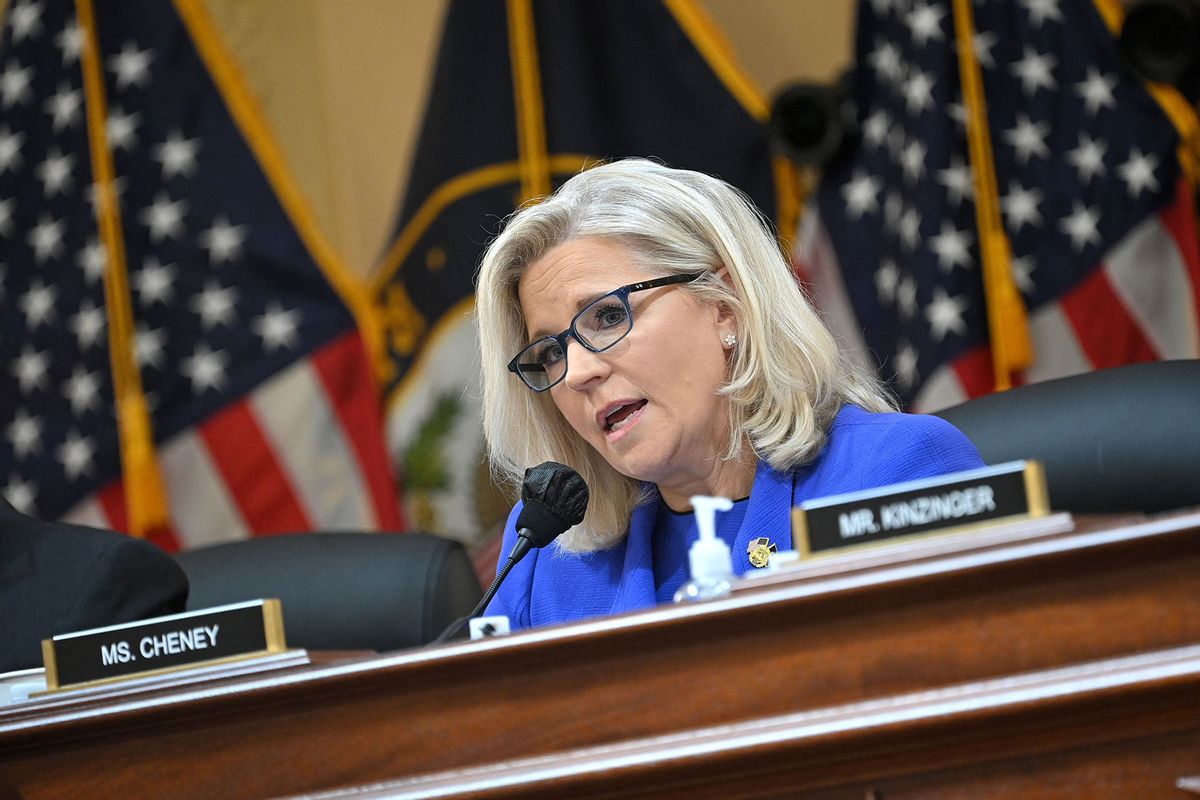Congresswoman Liz Cheney on Tuesday revealed some attempts to intimidate witnesses cooperating with the House committee investigating the January 6, 2021 insurrection and signaled that the panel plans to share additional details at future hearings.
The Wyoming Republican provided examples during her closing remarks at a surprise hearing that focused on bombshell testimony from Cassidy Hutchinson, who served as a special assistant to Mark Meadows, former President Donald Trump's chief of staff.
"While our committee has seen many witnesses, including many Republicans, testify fully and forthrightly, this has not been true of every witness—and we have received evidence of one particular practice that raises significant concern," explained Cheney, vice chair of the House Select Committee to Investigate the January 6th Attack on the United States Capitol.
"Our committee commonly asks witnesses connected to Mr. Trump's administration or campaign whether they've been contacted by any of their former colleagues or anyone else who attempted to influence or impact their testimony," Cheney continued.
The congresswoman then shared two samples of answers the panel received to that question, without identifying any of the involved parties.
In response to the examples—which were also shared in full on the committee's Twitter account—Congresswoman Marie Newman, D-Ill., who is not on the panel, said: "Witness intimidation. Clear as day."
That was a widely shared sentiment, and some viewers of the hearing called for action by the U.S. Department of Justice (DOJ)—specifically, Attorney General Merrick Garland.
"Your move, Merrick," tweeted Salon politics writer Amanda Marcotte.
Aki Peritz, a former counterterrorism analyst for the U.S. government, said that "this is mob boss/clear witness intimidation behavior. DOJ, I hope you're taking notes."
Journalist Aaron Rupar similarly asserted that the messages featured "big mob boss energy."
University of Michigan law professor Leah Litman agreed that this is "how mobsters do witness intimidation."
Sean Eldridge, founder and president of the progressive advocacy group Stand Up America, pointed out that "you don't tamper with witnesses like this if you have nothing to hide," and called the revelations "one more layer of Trump's criminal conspiracy."
Cheney said that "I think most Americans know that attempting to influence witnesses to testify untruthfully presents very serious concerns. We will be discussing these issues as a committee, carefully considering our next steps."
Some legal experts observing the hearing highlighted 18 U.S. Code § 1512, which addresses tampering with a witness, victim, or an informant.
"Make no mistake, those texts we just saw will certainly lead to criminal investigation and perhaps prosecution under 18 USC 1512, which punishes witness intimidation with fines, imprisonment for not more than 20 years, or both," said Brookings Institution senior fellow Norm Eisen.
Even some former Trump allies acknowledged the significance of the development. Mick Mulvaney—who held multiple posts in the administration, including acting White House chief of staff—said that "Cheney's closing is stunning: They think they have evidence of witness tampering and obstruction of justice."
"There is an old maxim: It's never the crime, it's always the cover-up," Mulvaney added. "Things went very badly for the former president today. My guess is that it will get worse from here."
The panel's last-minute hearing was announced Monday. As Punchbowl News reported early Tuesday:
Most importantly, we're told Hutchinson's firsthand account—her direct testimony and evidence—meaningfully informs the hearings the panel has planned for July. There have also been "sincere concerns" about Hutchinson's physical security because of what she knows and has revealed to the committee, we're told.
Due to these reasons, select committee members felt they had to hold the hearing today and couldn't wait until the House returns from recess in mid-July.
For nearly two hours Tuesday afternoon, Hutchinson testified about various events related to January 6 and efforts to overturn the 2020 presidential election, from Meadows and Trump attorney Rudy Giuliani seeking pardons to alleged actions by the former president—including throwing his lunch against a White House wall in a fit of rage, demanding that armed supporters be allowed into a designated rally area, and assaulting a member of his security team who wouldn't take him to the Capitol.



Shares